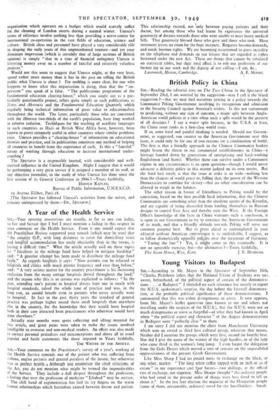SIR,—Your comment on the Practitioner's survey of a year's working
of the Health Service reminds one of the patient who was suffering from asthma, angina pectoris and general paralysis of the insane, but otherwise was in perfect health. Although you enumerate the chief criticisms of the Act, you do not mention what might be termed the imponderables of the Service. They include a dull despair throughout the profession, a feeling that over the profession of medicine " Ichabod" may be written. The chill hand of regimentation has laid its icy fingers on the warm human relationships which heretofore existed between doctor and patient.
This relationship existed, not only between paying patients and their doctor, but among those who had learnt by experience the universal generosity of doctors towards those who were unable to meet heavy medical bills. That generosity blessed those who gave and those who took. Mass treatment leaves no room for the finer instincts. Requests become demands, and needs become rights. We are becoming accustomed to gross incivility on the telephone and demands on our leisure that arc regarded as rights bestowed under the new Act. These are things that cannot be tabulated on statistical tables, but their total effect is to rob our profession of our former joy in our work and the dignity of our calling.-1 am, &c.,














































 Previous page
Previous page